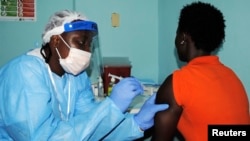West Africa is slowly beating back the Ebola epidemic, but mental health professionals say the outbreak has left thousands of people traumatized, and the three hardest-hit countries have few resources to help them.
Many of the people in Sierra Leone, Guinea and Liberia who survived the regional Ebola outbreak did not emerge unscathed. Mental health professionals say the virus, which has killed more than 11,000 people in the three countries, caused widespread trauma and mental health issues.
George Bindi is a mental health expert in Sierra Leone. He says the months of fighting the disease have taken a toll on the people of his country.
“People see young ones die right in front of them. Customary practices to honor the dead were neglected, and it’s one of the most painful things when the culture was broken like that without any timing," said Bindi. "Nobody knew it was going to happen, and it just happened so people were not prepared, psychologically prepared for that, and it’s just very painful.”
Bindi and other mental health experts gathered in Monrovia on Thursday to discuss how best to help survivors of the Ebola outbreak grapple with their mental trauma. They face an uphill battle. The three countries are deeply impoverished, and their health-care systems were struggling even before Ebola first appeared in Guinea in late 2013.
Fahmy Hanna, who works on mental health with the World Health Organization, says part of the problem is that mental health counselors are so rare in the region.
“There’s only one psychiatrist in Liberia, there’s only one psychiatrist in Sierra Leone serving 4.5 million population there, four psychiatrists in Guinea serving the whole population. So the only way is training non-specialist health-care professionals in providing the service," said Hanna.
Many of the hospitals and clinics in these three countries are crumbling, and that in and of itself is another problem, says Janice Cooper, head of the Carter Center’s mental health program in Liberia. Counseling cannot be effective in places where people don’t feel comfortable, she says, so investment in infrastructure is needed.
“Those facilities need to be places where people feel comfortable going to," said Cooper. "If they’re in disrepair, if they don’t have any sanitation facilities or latrines, if the ceiling is all leaking, it’s not going to be a place that’s going to be very conducive [to effective treatment].”
While WHO has certified that Liberia is free of Ebola, both Guinea and Sierra Leone are still battling new cases of the virus.




